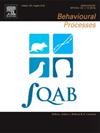Conspecific presence affects foraging decisions of insular and mainland Aegean wall lizards (Podarcis erhardii)
IF 1.3
4区 生物学
Q4 BEHAVIORAL SCIENCES
引用次数: 0
Abstract
Conspecifics often constitute a valuable source of information. For instance, animals are often attracted to a foraging site by the presence of conspecifics, a phenomenon known as ‘local enhancement’. Theory predicts that animals should engage in local enhancement only when associated benefits (efficient resource detection) outweigh the costs (increased interference competition), a trade off that depends on environmental context. Insular and mainland habitats differ in key ecological factors, such as predation pressure, competition, and food availability, which likely affect how animals use social cues while foraging. Here, we compared the local enhancement behaviour of Aegean wall lizards from three small islets, two larger islands, and two mainland sites in Greece. In the wild, lizards were offered food near a transparent container that either held a conspecific (social trials) or was empty (control). We then compared whether and how fast individuals would (1) emerge near, (2) approach, and (3) start eating the food, between social and control situations, and among habitats (mainland, island, or islet). We also looked at whether the presence of conspecifics – confined, or free-roaming when multiple lizards were attracted – provoked interference competition. Conspecific cues influenced foraging decisions in a complex manner. The presence of confined conspecifics had only minor effects, but other free roaming conspecifics accelerated or inhibited foraging activities, depending on their type (emerging, approaching, eating). Insular lizards also engaged in more aggressive interactions than mainland ones. Our results indicate that the costs and benefits of local enhancement may vary geographically, but they are inconclusive due to methodological limitations. Further research is needed to identify the environmental conditions favouring the evolution of local enhancement and social cognition.
同种存在影响岛屿和大陆爱琴海壁蜥的觅食决策。
具体情况往往构成有价值的信息来源。例如,动物经常被同种生物吸引到觅食地点,这种现象被称为“局部增强”。理论预测,只有当相关收益(有效的资源探测)超过成本(增加干扰竞争)时,动物才会参与局部增强,这种权衡取决于环境背景。岛屿和大陆栖息地在关键生态因素上有所不同,比如捕食压力、竞争和食物供应,这可能会影响动物在觅食时如何使用社会线索。在这里,我们比较了来自希腊三个小岛、两个较大岛屿和两个大陆地点的爱琴海壁虎的局部增强行为。在野外,蜥蜴在一个透明的容器附近获得食物,这个容器要么装有同种动物(社会试验),要么是空的(对照组)。然后,我们比较了个体是否会(1)出现在附近,(2)接近,(3)开始吃食物,在社会和控制情况下,以及在栖息地(大陆,岛屿或小岛)之间。我们还研究了同种蜥蜴的存在——当吸引了多只蜥蜴时,被限制的或自由漫游的——是否会引发干扰竞争。同种线索以复杂的方式影响觅食决策。禁闭同种虫的存在对其影响较小,但其他自由漫游同种虫则根据其类型(出现、接近、进食)加速或抑制其觅食活动。岛屿上的蜥蜴也比大陆上的蜥蜴更具攻击性。我们的研究结果表明,局部增强的成本和收益可能在地理上有所不同,但由于方法的限制,它们是不确定的。需要进一步的研究来确定有利于局部增强和社会认知进化的环境条件。
本文章由计算机程序翻译,如有差异,请以英文原文为准。
求助全文
约1分钟内获得全文
求助全文
来源期刊

Behavioural Processes
生物-动物学
CiteScore
2.70
自引率
7.70%
发文量
144
审稿时长
4-8 weeks
期刊介绍:
Behavioural Processes is dedicated to the publication of high-quality original research on animal behaviour from any theoretical perspective. It welcomes contributions that consider animal behaviour from behavioural analytic, cognitive, ethological, ecological and evolutionary points of view. This list is not intended to be exhaustive, and papers that integrate theory and methodology across disciplines are particularly welcome.
 求助内容:
求助内容: 应助结果提醒方式:
应助结果提醒方式:


